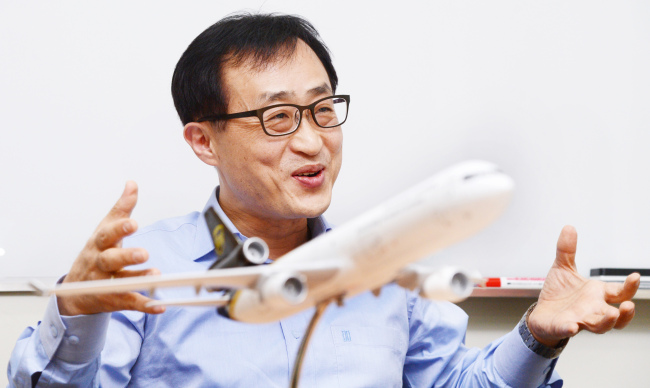UPS Korea’s new head J.K. Rha has taken over the helm in tough times, when the prolonged economic slowdown has cut global demand for shipping.
More recently, the crash landing of an Asiana Airlines jetliner is also expected to put more security pressure on the logistics industry, he said.
But the regional chief of the Atlanta-based global logistics company said he was also a firm believer that crisis yielded opportunity.
“It would be also more rewarding to achieve good results when the whole market is slowing down,” he said in a recent interview with The Korea Herald.
 |
J.K. Rha, head of UPS Korea, poses at his office in Seoul. (Park Hyun-koo/The Korea Herald) |
“About flight security, we have already continued efforts to respond to possible changes such as more enhanced airport checkups.”
Rha, former air export and package operation manager, joined the Korean unit in 1990 and took office as the country chief in May. He has served diverse positions not just in Korea but also in Hong Kong and Singapore.
Despite some risk factors facing the company, Rha hinted the company would see higher annual growth this year, though declined to reveal specific figures.
The UPS head office is also pinning high hopes on the Korean market, he said.
“Even though UPS relocated its air hub to China few years ago, Korea is also playing the hub role,” he said. “Korea still has price competitiveness compared to Japan, while its infrastructure, including Incheon International Airport, allows more flexibility for businesses.”
Korean big names such as Samsung and Hyundai are also crucial clients for UPS. Recently, the Korean unit set up special teams dedicated to covering the information technology and automotive sectors separately.
“Considering the strong performance of Korean players in the two fields, we thought customized and specialized services would be more appealing to clients,” he said.
Rha acknowledged that Korea’s free trade agreements with the United States and European Union boosted trade especially in the IT and auto industries.
But the company is also renewing its focus on smaller firms here that are trying to expand their presence in overseas markets, he said.
Of course, not just UPS but also its archrivals such as FedEx and DHL are seeing more opportunities in the Korean market, heating up their traditional competition everywhere they do business.
“In the past, clients used to select logistics partners considering their shipping schedules. But now they require more specialized, customized services, which is also where we can differentiate ourselves from other companies,” he said.
While increasing the number of flights and expanding airport warehouses here, UPS has recently launched a new express air freight service, UPS Worldwide Express Freight, for urgent, time-sensitive and high-value international heavyweight shipments.
“Customers can ship pallets as easily as packages exclusively within UPS’s global air network. This guaranteed, door-to-door service features some of the fastest times in the industry,” he said of the new service.
The company also started a new labeling service that shows the client’s corporate logo on the tracking label, a free-of-charge service that also serves as a mobile advertisement.
About the global expansion of Korean logistics companies, he advised hiring more locals to do business in the market like UPS, whose 487 employees here are all Korean.
“Korean firms are now focusing more on delivering Korea-made products to overseas markets. But in the longer term their clients should include local firms,” he said.
“I think they could secure more competitiveness by hiring employees locally like UPS.”
By Lee Ji-yoon (
jylee@heraldcorp.com)







![[From the Scene] At this Starbucks, you need ID: Franchise opens store with view of North Korea](http://res.heraldm.com/phpwas/restmb_idxmake.php?idx=644&simg=/content/image/2024/11/29/20241129050068_0.jpg)
